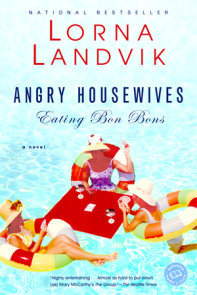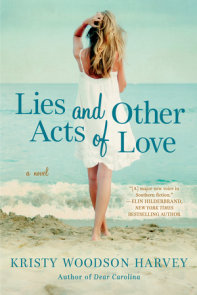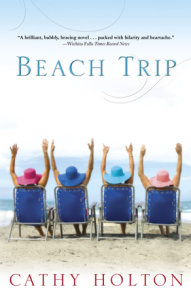READERS GUIDE
Questions and Topics for Discussion
INTRODUCTION
Fearless and free-spirited, Nan is not your typical sixty-five-year-old woman. Living alone in Windermere, her grand but ramshackle home on Nantucket, Nan indulges her eccentricities and doesn’t care what anyone thinks. Lately, however, Nan has been growing nostalgic for the days when her home was filled with family and fun. When she receives news that the savings she depends on have wasted away to nothing, Nan hits upon a solution that will solve both her problems. She decides, with a little pluck and a lot of determination, to bring in summer lodgers. Little does she know that as much as she needs these house guests, they need her, too. Soon, three arrivals are welcomed into Nan’s open arms: Daff, a long-suffering single mother who feels the lingering effects of a painful divorce; Daniel, who is coming to terms with a long-buried secret about himself; and, finally, Michael, Nan’s own son, returning home with a broken heart and a heavy conscience. With Windermere now bursting with life, Nan and her guests discover that just when you think one phase of your life is over, a new and exciting one can begin.
Author Jane Green is known for her charming heroines, and the willful, independent Nan is no exception. Green weaves Nan’s story together with those of a cast of compelling characters, demonstrating her celebrated warmth and wit on every page. From Daniel’s search for identity to Daff’s journey to love again, Green has created a group of individuals who meet at a pivotal moment in each of their lives, and in Nan she has created a memorable and moving character to anchor the entire story. Nan has an intuitive ability to understand her guests’ needs and desires, and her carefully planned efforts help make those desires a reality. Happily, by helping others, Nan’s own desires are fulfilled, as she is surrounded by the laughter and love she so craves. Yet, surprises lurk around every corner of Green’s fast-paced plot. As soon as the summer in Windermere seems perfect, an unexpected guest brings both joy and heartache—and binds the characters more closely than they ever imagined possible.
Honest and heartwarming, The Beach House is an intimate read but large enough in scope to contain all the pains and pleasures that are a part of real life: infidelity and family drama, romance and real estate schemes, and so much more. Each character is on a journey of self-discovery and a personal search for truth, and as Green teaches her characters to forgive, accept, and embrace themselves and others, she shows that life is filled with surprises as well as love from the most unexpected places.
ABOUT JANE GREEN
Jane Green is the internationally bestselling author of The Other Woman, Swapping Lives, and Second Chance. Before achieving great success with her first novel, Straight Talking, Green worked as a journalist in the United Kingdom. A mother of four, she currently resides in Connecticut with her partner and children. This is her tenth novel.
A CONVERSATION WITH JANE GREEN
Q. Where did you find your inspiration for this particular book? Is Nan based on anyone in your own life?
When I first moved into my tiny cottage by the beach the summer of my divorce, I found myself falling slowly in love with my landlord (we now live together, in a bigger house a couple of blocks away). Part of our courtship involved long walks by the beach at midnight, and there was a fabulously glamorous woman of a certain age whom we used to see riding her bike, cigarette in hand, at one or two in the morning. I was fascinated by her, and certainly held that image of her while I was creating Nan.
Q. Throughout your work, you’ve created a number of memorable heroines. Is it possible to read Nan as an older version of any of the younger heroines you’ve written about in earlier books? Are there any different considerations necessary when writing about an older character?
I think my characters all share similar sensibilities, and perhaps the only real difference with Nan is that age has given her a wisdom and an acceptance that some of the younger characters might not have. I don’t ever stop to analyze whether something makes sense—when I’m writing characters, and particularly someone as vivid as Nan, they become their own people, and I allow them, as pretentious as it may sound, to dictate their own behavior.
Q. The women in The Beach House could be seen as existing on the same plane of female experience but at different points in their lives: daughters, mistresses, wives, single parents, widows. What connections, if any, did you intend the reader to draw between these characters?
I’m not sure I intend my readers to draw connections between the characters, but more to draw connections between each of the characters and their own lives. While we may not have been mistresses, widows, single parents, etc., my hope is always that their truths resonate with us—that we are able to understand their plight because it could so easily be ours.
Q. At Windermere, the characters are able to be true to themselves in ways that their former lives didn’t permit, for in order to be good spouses, parents, or employees, it is often necessary to suppress or sacrifice aspects of one’s identity. Has this ever been true in your own life?
Ah yes. I was married at thirty, and very much shoehorned myself into who I thought I was expected to be. Like many women, I am something of a chameleon, but as I have grown older I have come to realize that it is necessary to be all things at all times, and that when we try to suppress a part of ourselves for any length of time, it can only lead to unhappiness. I played a part during my marriage, revealing only the side of my character that fitted in with the role I was expected to play, and it is only now, post-divorce, with a new love, that I am able to be fully myself.
Q. The issue of infidelity appears repeatedly in the novel, and from a number of different perspectives. Why did you decide to use that as a recurring theme? As an author, how did you manage to stay sympathetic to both the victims and guilty parties involved in the affairs?
I have always been fascinated by the notion of infidelity, by what makes people commit this ultimate betrayal, by how so many seem to be able to compartmentalize their lives. On the one hand, they have families, children, people they love, and on the other, they are able to sleep with other people, believing it to be just physical, or somehow quite separate from their family life. I have been around infidelity, and I suspect keep writing about it in a quest for some understanding.
Q. You are known for presenting romance in a realistic light, flaws and all. Why is that important to you? Is it difficult to present realistic romantic relationships while maintaining optimism and enthusiasm? How do you believe the storybook images of romance presented in books and films today affect women’s expectations of love?
My answer today is very different from my answer of ten years ago. Ten years ago I didn’t believe in storybook romance, confused lust and passion with love, had no real understanding of what it meant, and consequently settled for less than I deserved. Ten years on, I now know what love is—that it is, as I wrote in my first novel, Straight Talking, passion, admiration, and respect. But that it is also kindness, consideration, and peace. I absolutely believe that romance is alive and thriving and that it is absolutely possible to have the great relationships we see in movies, but that they may not come in the form we expect.
Q. You created a large cast of characters in The Beach House—which character is your favorite?
I think I probably adore Nan most of all—her love of life and acceptance of life on life’s terms, but Daniel is also close to my heart. He was perhaps the most frightening to write—his story, after all, is clearly not mine—but I love his journey and seeing him find himself.
Q. The Beach House moves through a number of characters’ plot lines and yet the narrative is always clear and the stories blend seamlessly. What are some of the difficulties specific to managing multiple narratives? How do you keep all the characters’ stories clear during the writing process?
Whoever your inspiration, whatever you have drawn upon to create their characters, when you get it right they very quickly become their own people, with distinctive voices, quirks, and actions. I so often feel like I am watching a movie in my head, simply putting down on the page what I see my characters do, with no conscious direction from me.
Q. As a writer, what is it about the female experience you find so intriguing and rich in material? Would you ever consider writing a novel entirely from a male perspective?
I am intrigued by our chameleon-like qualities, by our people-pleasing, by our intuition and strength. I haven’t yet wanted to write a novel from a male point of view, but who knows what will happen.
Q. What experience or emotions do you hope your readers take away from The Beach House? Do you have a particular message or lesson at the core of your novels?
When I look back over the novels I wrote during my marriage, I realize how many of my female protagonists were married and unhappy, or lonely, or searching. From Sam in Babyville to Amber in Swapping Lives, I think those women were reflective of where I was, but couldn’t face. I have written for a long time about women on a journey to find happiness. But I realized only recently that happiness comes in the form of peace, and now, at the core of my novels, I would say is the quest for peace, for home.
Q. Your novels are very popular both in the U.S. and in the U.K., you have very loyal fans, and you maintain an active Web site. What are some of the most surprising, touching, or memorable responses you’ve had to your work so far?
My readers continue to astound me with extraordinary and heartfelt letters. Writing is such a solitary life, and every one of those letters touches me and inspires me to carry on.
DISCUSSION QUESTIONS



















